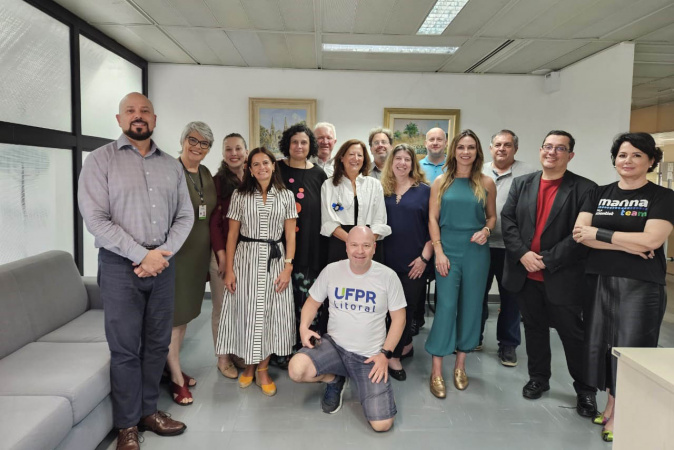More than 200 professors and researchers participated in a debate on “Scientific Experiments and Diffusion in Brazil and Portugal,” held at the Oscar Niemeyer Museum in Curitiba. This event, promoted by the New Arrangement for Research and Innovation (NAPÌ) Paraná Vaz Ciencia, from the Araucaria Foundation, contributed to strengthening the partnership signed in June between Paraná and Portugal in the fields of education and scientific culture.
NAPI Paraná Faz Ciência aims to promote scientific and technological culture through integrated actions to disseminate knowledge, enhancing the population’s access to scientific academic activities.
The roundtable was attended by the President of Ciência Viva – the National Agency for Scientific and Technological Culture of Portugal, Rosalía Vargas, and the Director of the Department of Science, Technology and Scientific Education Mainstreaming of the Ministry of Science, Technology and Innovation, Juana Nunes. This Tuesday (19), Rosalía met with the First Lady of State, Luciana Saito Massa, the Minister of Science, Technology and Higher Education, Aldo Bona, and the CEO of the Araucaria Foundation, Ramiro Wahrhaftig.
The Portuguese researcher highlighted the initiative of NAPIs, especially Paraná Faz Ciência, in the work of scientific education and dissemination of the topic. “What I saw here in Paraná is extraordinary. What can the state do by involving very motivated teams that believe it is necessary to work in the community to get good results. Paraná Faz Ciência offers excellent conditions for the implementation of very practical and integrated projects,” he said.
The President of Ciência Viva also highlighted statistical data regarding the progress of interest in science in Portugal. He added: “In 2005, only 14% of the population was interested in science and technology, and this percentage will rise to 60% in 2021.”
The Director of the Ministry of Science, Technology and Innovation, Juana Nunes, defended the expansion of this model in Brazil. She also commented that the Ministry is working to systematize Brazil’s science popularization policy, one of the axes of which is to clarify state networks.
“Paraná is progressing, as it already has a network under development. We want to ensure that Paraná and Brazilian citizens receive the best in scientific production, which is why it is also necessary for the children to have a school that experiences scientific research “Education from A to Z,” said Juana Nunes. “This coordination of National Action Programs (NAPIs) is very smart because we need to join forces. “When we bring projects, ideas and human resources together to build a science dissemination programme, we get more effective results.”
Deborah Santana, technical advisor at Fundação Araucária, and Rodrigo Reyes, professor at the Federal University of Paraná, coordinators of NAPI Paraná Faz Ciência, presented the main actions already developed for the dissemination and popularization of science.
According to Deborah, the new arrangement seeks to involve basic education students in all stages of scientific research through citizen science. She also pointed out some challenges. “We need a language that is accessible to everyone, in a diverse and attractive way. Disseminating science is also a way to strengthen social control over public resources,” he stressed. In the state, one of the initiatives in this area is the Newton Freire Maya Science Park, in the Curitiba metropolitan area.
For Rodrigo Reis, Ciência Viva is a global example of a publishing network for promoting scientific culture. “The Portuguese agency inspired us to work with the Araucaria Foundation in implementing a local network,” he said. “One of the actions that draws attention is the network of science farms, which are small farms and ranches that spread science through regional innovation ecosystems. This meeting helped to understand more about this process, which is very applicable to the reality of Paraná.”
New meeting – A new meeting is scheduled for this week. Another edition of the debate “Scientific Experiments and Publishing in Brazil and Portugal” will be held on Thursday (21), at 2:30 pm, in the Unioeste Hall in Foz do Iguaçu.

“Wannabe internet buff. Future teen idol. Hardcore zombie guru. Gamer. Avid creator. Entrepreneur. Bacon ninja.”

